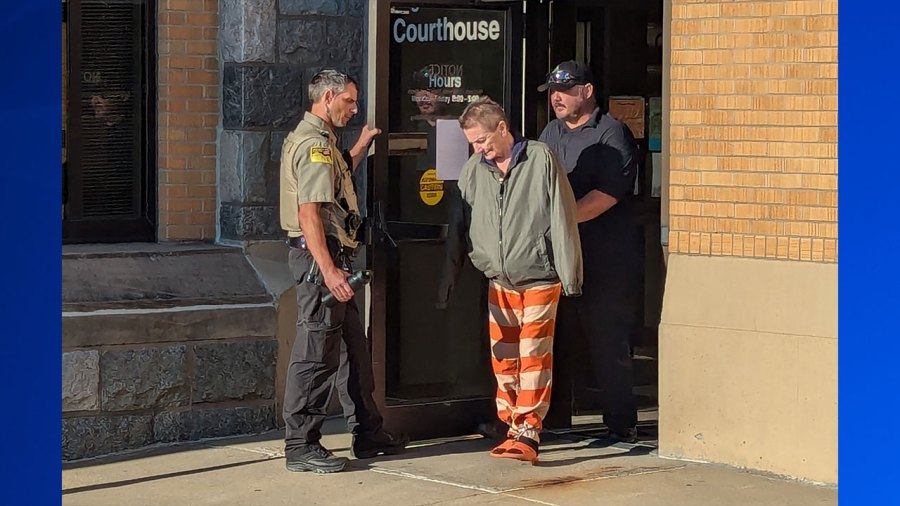PIERRE, S.D. (KELO) — The first day of the criminal trial for a former employee accused of stealing more than $1.7 million from the South Dakota Department of Social Services featured five of the prosecution’s witnesses explaining how the alleged crimes occurred.
Lonna Carroll, who has pleaded not guilty to two charges of grand theft, listened and sometimes conferred in whispers with her court-appointed defense attorney throughout their testimony.
Police: Suspect arrested after shooting officer in SF
At one point her attorney, Tim Whalen of Lake Andes, with the jury as well as his client out of the courtroom, objected to all of the exhibits that state prosecutors had introduced or plan to offer as evidence. Whalen argued that the statute of limitations had expired and therefore none of the exhibits were relevant.
Carroll is accused of taking a total of $1,777,665.73, on 215 different occasions over 13 years, from what are known as “own accounts” that the department’s Child Protection Services Division maintains for children in its care. Carroll, an administrative assistant in the division, had authorization to both make requests for payments and to authorize those payments.
“I already ruled on that,” Circuit Judge Christina Klinger replied to Whalen, referring to a pre-trial order she had made a few weeks ago, after Whalen had sought dismissal of the charges against Carroll. Whalen told the court on Tuesday that he was renewing the objection so that it would be preserved for an appeal.
State Attorney General Marty Jackley and Nolan Welker, an assistant attorney general, presented the trial’s first five witnesses.
Carrie Watts, who started working in the department’s finance division in October 2022. In October 2023, Watts came across oddities when she tried to reconcile amounts in the children’s own accounts.
Watts took the matter to her supervisor, Bill Regynski. He is accounting and financial reporting manager for the department. Regynski said he looked into the children’s own accounts that Watts had drawn to his attention and saw many more transactions than normal. He reported it to his superiors, and the state Division of Criminal Investigation was then contacted.
Tonia Bogue is the program specialist overseeing the Family and Child Information System, known as FACIS, that the Child Protection Services Division uses. She testified about the screenshots of prior authorization documents used to request money for children’s needs such as clothing and bedding.
Bogue confirmed that Carroll had authorization to both request and approve those prior authorizations and acknowledged that none of Carroll’s supervisors had approved those requests. “Who should have been looking to make sure that doesn’t happen?” Whalen asked Bogue. She replied, “I don’t know.”
Project Prison Reset: What’s coming first
Carroll took checks to the Pierre branch of American Bank & Trust where the Department of Social Services has its local account. Aimee Parsons, the branch manager, said she assisted Carroll many times when Carroll arrived with a check for deposit. Parsons said Carroll would deposit the check, then withdraw the same amount in cash.
No one at the bank questioned what Carroll was doing, according to Parsons. “She was authorized to conduct those transactions. It was not for us to say,” Parsons said.
Parsons said Carroll would deposit checks that were more than $10,000 into two accounts. By doing so, the bank wouldn’t be required to report any single transaction for more than $10,000 to federal authorities. Known as a currency transaction report, or CTR, the regulation is intended to identify possible instances of money-laundering. Parsons said she didn’t suspect Carroll was engaging in any illegal activities.
The fifth witness on Tuesday was Haleigh Nevill, the Banking Secrecy Act and fraud manager for American Bank & Trust in Sioux Falls. She testified about the bank’s internal records regarding withdrawals, specifically the debit tickets and cash-out tickets associated with Carroll’s transactions.
Nevill said the bank didn’t specifically monitor Carroll’s transactions. Whalen asked whether the bank had a responsibility to inform federal authorities about repeated instances of Carroll coming close to the $10,000 CTR threshold. “Not that I could recall,” Nevill said. She noted that American Bank & Trust uses an automated monitoring system for when a currency transaction report might be needed.
The trial resumes on Wednesday morning and is scheduled to run through Friday. The witness testimony started Tuesday after a jury had been selected that morning.




